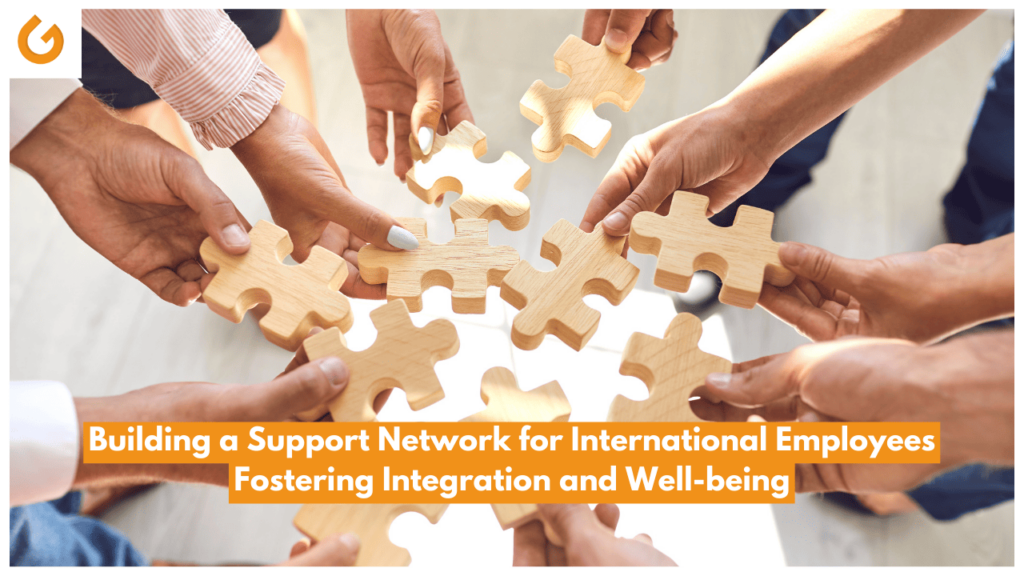In today’s globalised world, medium to large-sized companies in 1st world countries often employ a diverse workforce, including international employees. These employees face unique challenges as they adapt to a new environment and culture. To ensure their successful integration and overall well-being, companies must develop and maintain a robust support network.
This article outlines the importance of such a support network, the top five benefits, strategies for promoting integration and well-being, and two hypothetical case studies to illustrate these concepts. Finally, we offer recommendations for companies on how to start building or improve their support networks.
Quick Navigation
The Importance of a Support Network for International Employees
hallenges Faced by International Employees International employees face numerous challenges when adapting to a new work environment and culture, including:
- Adapting to a new work culture: Understanding and adjusting to different communication styles, workplace norms, and expectations can be challenging.
- Navigating language barriers: Proficiency in the local language is crucial for effective communication and integration.
- Building social connections: Forming new friendships and support networks in a new country can be difficult and isolating.
- Managing homesickness and culture shock: The emotional strain of leaving behind family, friends, and familiar surroundings can impact well-being.
- Accessing local resources and services: Finding and utilizing local services, such as healthcare, housing, and transportation, can be daunting.
Related: Supporting Employees Returning Home
Top 5 Benefits of Support Networks for International Employees

Support networks for international employees offer numerous benefits for both employees and companies, including:
- Improved Employee Retention A strong support network reduces stress and isolation, increasing job satisfaction and the likelihood that international employees will stay with the company long-term.
- Enhanced Productivity and Performance When international employees feel supported, they can focus on their work and contribute more effectively, leading to increased productivity and better performance.
- Strengthened Company Culture and Diversity Support networks promote cross-cultural understanding and appreciation, fostering a more inclusive and harmonious work environment.
- Increased Attractiveness to Global Talent Companies with established support networks for international employees are more appealing to global talent, which can improve recruitment efforts and help build a diverse workforce.
- Fostering Innovation and Collaboration Diverse perspectives and experiences can lead to increased innovation and collaboration, driving the company’s success.
Strategies and Initiatives for Promoting Integration and Well-being
To promote integration and well-being for international employees, companies can implement several initiatives, such as:
- Onboarding and Orientation Programs Tailored onboarding programs can help international employees understand company culture, policies, and expectations while providing essential information about living and working in the new country.
- Language and Culture Training Offering language courses and cultural workshops can help international employees improve communication skills and better understand the local culture.
- Mentorship and Buddy Systems Pairing international employees with experienced colleagues can provide guidance, support, and an opportunity to build social connections.
- Social Events and Networking Opportunities Organizing social events and networking opportunities can help international employees form friendships and professional connections, reducing isolation and promoting integration.
- Access to Local Resources and Services Providing information and assistance with local resources and services, such as healthcare, housing, and transportation, can ease the transition for international employees.
Hypothetical Case Studies

Case Study 1: TechCorp – Implementing a Comprehensive Support Network
- Background: TechCorp, a global technology company, employs a significant number of international employees.
- Challenges faced by international employees: Adapting to work culture, language barriers, and building social connections
- Support network initiatives and their impact: TechCorp implemented an onboarding program, language and culture training, mentorship system, social events, and provided access to local resources. These initiatives led to improved employee retention, increased productivity, and a stronger company culture.
- Lessons learned and recommendations: TechCorp’s experience demonstrates the importance of a comprehensive support network and the need for continuous evaluation and improvement.
Case Study 2: HealthGlobal – Expanding an Existing Support Network
- Background: HealthGlobal, an international healthcare company, has a diverse workforce and an existing support network for international employees.
- Challenges faced by international employees: Despite the existing support network, international employees still faced difficulties in adapting to the work environment and culture.
- Expansion of support network initiatives: HealthGlobal expanded its support network by enhancing its onboarding program, offering advanced language courses, increasing the number of social events, and providing tailored assistance for local resources and services.
- Outcomes and recommendations: The expanded support network led to better integration, higher job satisfaction, and increased collaboration among employees. HealthGlobal’s experience highlights the need to regularly assess and expand support networks to address evolving employee needs.
Recommendations for Companies on Building or Improving Support Networks

To build or improve support networks for international employees, companies should consider the following recommendations:
- Assess the Current State of Support for International Employees Evaluate existing support structures, resources, and initiatives to identify areas for improvement and determine the needs of international employees.
- Establish Clear Objectives and Metrics for Success Define specific goals for the support network, such as improving employee retention or enhancing productivity, and establish measurable metrics to track progress.
- Involve Key Stakeholders and Seek Employee Input Collaborate with management, HR, and international employees to ensure that support network initiatives address the unique needs and challenges faced by international employees.
- Develop and Implement Support Network Initiatives Based on the assessment and input from stakeholders, design and implement initiatives that promote integration and well-being, such as onboarding programs, language training, mentorship systems, and social events.
- Continuously Monitor, Evaluate, and Adjust the Support Network Regularly assess the effectiveness of support network initiatives, gather feedback from international employees, and make adjustments as needed to ensure ongoing success.
Conclusion
Building a support network for international employees is essential for medium to large-sized companies in 1st world countries to ensure their successful integration and well-being. By understanding the challenges faced by these employees, implementing effective strategies and initiatives, and continuously evaluating the support network, companies can enjoy increased employee retention, enhanced productivity, and a stronger company culture.









